
The General is a 1926 American silent slapstick Western action comedy film released by United Artists. It was inspired by the Great Locomotive Chase, a true story of an event that occurred during the American Civil War. The story was adapted from the 1889 memoir The Great Locomotive Chase by William Pittenger. The film stars Buster Keaton, who also co-directed it along with Clyde Bruckman.

Maria Isabella Boyd, best known as Belle Boyd was a Confederate spy in the American Civil War. She operated from her father's hotel in Front Royal, Virginia, and provided valuable information to Confederate General Stonewall Jackson in 1862.

Elizabeth Van Lew was an American abolitionist and philanthropist who built and operated an extensive spy ring for the Union Army during the American Civil War. Many false claims continue to be made about her life. The single most reliable source is a 2002 biography by University of Virginia professor Elizabeth R. Varon.
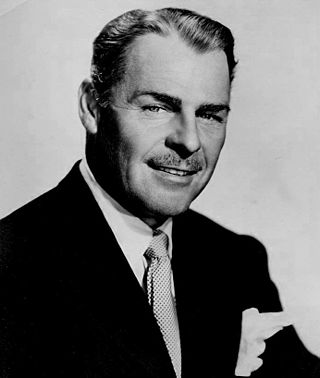
Waldo Brian Donlevy was an American actor, who was noted for playing dangerous and tough characters. Usually appearing in supporting roles, among his best-known films are Beau Geste (1939), The Great McGinty (1940) and Wake Island (1942). For his role as the sadistic Sergeant Markoff in Beau Geste, he was nominated for the Academy Award for Best Supporting Actor.

The Great Locomotive Chase was a military raid that occurred April 12, 1862, in northern Georgia during the American Civil War. Volunteers from the Union Army, led by civilian scout James J. Andrews, commandeered a train, The General, and took it northward toward Chattanooga, Tennessee, doing as much damage as possible to the vital Western and Atlantic Railroad (W&A) line from Atlanta to Chattanooga as they went. They were pursued by Confederate forces at first on foot, and later on a succession of locomotives, including The Texas, for 87 miles (140 km).
The Starbuck Chronicles are a series of historical fiction novels by British author Bernard Cornwell set during the American Civil War. They follow the exploits of Boston-born Confederate officer Nathaniel Starbuck.

Gods and Generals is a 2003 American epic war drama film written and directed by Ronald F. Maxwell. It is an adaptation of the 1996 novel of the same name by Jeffrey Shaara and prequel to Maxwell's 1993 film Gettysburg. Most of the film was personally financed by media mogul Ted Turner. The film follows the story of Stonewall Jackson from the beginning of the American Civil War to his death at the Battle of Chancellorsville.
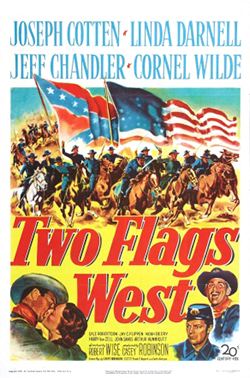
Two Flags West is a 1950 Western drama set during the American Civil War, directed by Robert Wise and starring Joseph Cotten, Jeff Chandler, Linda Darnell, and Cornel Wilde. The opening credits contain the following statement:
On December 8th, 1863, President Abraham Lincoln issued a Special Proclamation, whereby Confederate Prisoners of War might gain their freedom, provided they would join the Union Army to defend the frontier West against the Indians.
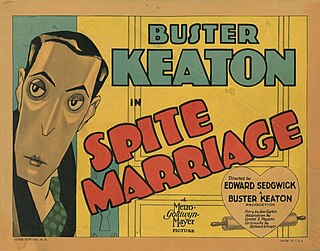
Spite Marriage is a 1929 American silent comedy film co-directed by Buster Keaton and Edward Sedgwick and starring Keaton and Dorothy Sebastian. It is the second film Keaton made for MGM and his last silent film, although he had wanted it to be a "talkie" or full sound film. While the production has no recorded dialogue, it does feature an accompanying synchronized score and recorded laughter, applause and other sound effects in some scenes. Keaton later wrote gags for some up-and-coming MGM stars like Red Skelton, and from this film recycled many gags, some shot-for-shot, for Skelton's 1943 film I Dood It.

The Beefsteak Raid was a Confederate cavalry raid that took place in September 1864 as part of the Siege of Petersburg during the American Civil War. Confederate Maj. Gen. Wade Hampton led a force of 3,000 troopers of the Confederate States Army on what was to become a 100-mile (160 km) ride to acquire cattle that were intended for consumption by the Union Army, which was laying a combined siege to the cities of Richmond and Petersburg, Virginia.

The Destroyer is the name of three fictional superheroes appearing in American comic books published by Marvel Comics. The original incarnation was created by writer Stan Lee and artist Jack Binder and first appeared in Mystic Comics #6, being one of Lee's earliest creations during the Golden Age of Comic Books.

Crack-Up is a 1936 American film directed by Malcolm St. Clair. Peter Lorre plays a harmless, half-addled aircraft enthusiast who is actually a ruthless spy desperate to get his hands on the blueprints for an experimental aircraft for a trans-Atlantic flight. He faces off against Ace Martin, played by Brian Donlevy, the pilot of the aircraft, whose motives are spurred by feeling cheated by his own company. The supporting cast includes Helen Wood, Ralph Morgan and Thomas Beck.

The Last Outpost is a 1951 American Technicolor Western film directed by Lewis R. Foster, set in the American Civil War with brothers on opposite sides. This film is character actor Burt Mustin's film debut at the age of 67.

Watch the Birdie is a 1950 American comedy film directed by Jack Donohue and starring Red Skelton, Arlene Dahl and Ann Miller.

The Great Diamond Robbery is a 1954 American comedy film directed by Robert Z. Leonard and starring Red Skelton, James Whitmore, Cara Williams and Reginald Owen. It was produced and distributed by Metro-Goldwyn-Mayer.

Only the Brave is a 1930 American Pre-Code Civil War drama film directed by Frank Tuttle and starring Gary Cooper, Mary Brian, and Phillips Holmes.

Secret Service is a 1931 American Pre-Code drama film directed by J. Walter Ruben and written by Bernard Schubert. The film based on a play by William Gillette, stars Richard Dix, William Post Jr., Shirley Grey, and Nance O'Neil. The film was released on November 14, 1931, by RKO Pictures.
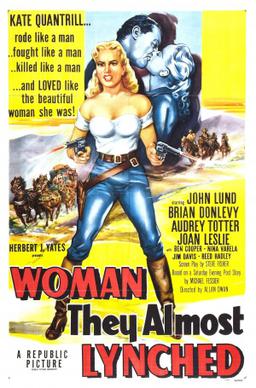
Woman They Almost Lynched is a 1953 American Western film directed by Allan Dwan and written by Steve Fisher. The film stars John Lund, Brian Donlevy, Audrey Totter, Joan Leslie, Ben Cooper, James Brown, and Nina Varela. The film was released on March 20, 1953, by Republic Pictures.
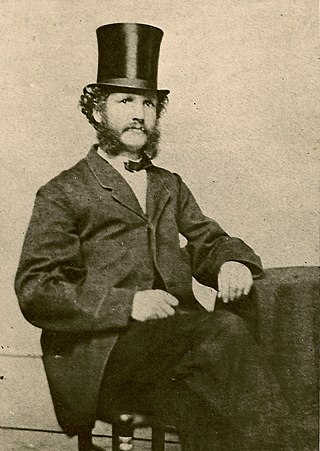
Pryce Lewis was an operative of the Pinkerton Detective Agency and Union spy during the American Civil War. His activities in Charleston, Virginia and the surrounding area heavily assisted the Union Army during the early years of the war. Lewis was later captured and played a part in the trial and execution of fellow agent Timothy Webster.

For the Cause of the South is a lost 1912 American silent film that portrayed a tragic, fictional romance set during the American Civil War. Directed by Bannister Merwin, the film was produced by Edison Studios, which was located in New York City, in The Bronx. The production starred Laura Sawyer, Benjamin Wilson, and Charles Ogle, with supporting characters played by Bessie Learn and James Gordon in the role of Confederate General Robert E. Lee.



















